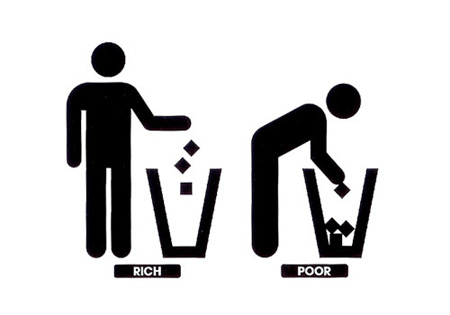
The premise behind the show is that a poor family and a rich family exchange houses and lives for a three day period in order to see how the other half lives. The simple ideas are often the best and, as far as I'm aware, such raising of class consciousness is unprecedented on prime-time Indonesian TV, which is usually so detached from reality that even the Sinetron actors have changed their names to Jeremy and the like.

As the SCTV show unfolded, I gleefully watched as the wealthy Pak Joko, along with his two young brats and Chanel brained wife left their huge Jakarta mansion and went to live in the considerably more pedestrian forest home (a hut in fact) of Pak Nuryanto's family. Meanwhile, Nuryanto, along with his wife and filial urchins headed up to the big smoke in order to luxuriate in Pak Joko's largesse.
We first see Joko and family tottering into the forest in their designer togs, lugging huge suitcases. When they finally clock the hut that there will be staying in its clear that the hapless patriarch Joko is going to have a fight on his hands convincing his petit bourgeois clan of the merits of the whole Tukar Nasib concept. In fact, the kids start crying and even the wife threatens to head home immediately, a disappointingly spineless but perhaps all too predictable reaction to an ordeal that will last a mere three days.
When Joko finally bundles them into the hut, a fresh challenge materialises as the camera crew gleefully dispossesses the family of their baggage and, horror of horrors, their mobile phones too, leaving them in what they are standing up in. Excellent. A veritable comedic banquet then ensues as The Swiss Family Joko battle with the reality of their situation, crying like babies and whining like the spoilt slobs they are.

Mrs. Joko tries to get the open fire going in order to cook and nearly burns the hut down. Ultimately this proves a waste of time anyway as the kids spit out the resulting meal immediately. The next day, Mr. Joko and his daughters attempt to plough the fields with the aid of a bull, which subsequently escapes whilst the unhappy crew continually fall arse over tit into the mud like baby hippos. Meanwhile the wife attempts to wash the family's clothing in a river and the garments are swept from her grasp and carried downstream. The family is also forced to deal with a snake that enters the hut, no doubt encouraged in by the TV crew outside in order to lend the show a bit of spice. It was a rum, rum do indeed.
Meanwhile, back in town, the dentally challenged Pak Nuryanto and family wonder wide eyed around Chez Joko like the Star Trek crew beaming down onto an alien planet. All is not rosy for the Nuryanto family either in their leap several dozen rungs up the social ladder. For a start, Mrs. Nuryanto is unable to use the washing machine and washes the clothes by hand before laying them out to dry on the immaculately manicured lawn outback. The stove also seems to be beyond Mrs. N. and she comically builds a brick stove in the garden.

Similar problems of technological illiteracy abound at the ATM and the wife and kids take a half hour extracting a few funds. Now I know why I'm often left frustratingly waiting outside the city's cashpoints, the things are full of migrant farmers. Ultimately though, the Nuryantos enjoy a nice satay dinner and, despite their travails and sense of alienation, manage to get through the three days with their dignity intact (i.e. without blubbing like big girls' blouses every five minutes like the Joko family do).
Eventually the two families return to their respective pads, both glad to be home. The Joko kids jump on their mobile phones like greyhounds on rabbits (they don't call them Crackberries for nothing) and the Nuryantos are finally able to get clean again in their river, as they felt that using a mandi was a trifle unhygienic.
One would hope that Tukar Nasib proves to be a learning experience for both families. The Jokos will ideally have learnt a little humility and been awakened to the great poverty that lies around them and the Nuryantos would have had their consciousnesses raised about inequality and class struggle.
Alas though, three days is certainly not a long enough time for this experiment to yield much in the way of results. Three months would have been better I think. In my fantasy though, the Nuryantos get into city life and refuse to leave the Joko residence, instead deciding to squat there permanently. The Jokos then have to retake their house by force using only Nuryantos rusty farming implements. Something to think about for the next series if any SCTV program planners are reading this.

